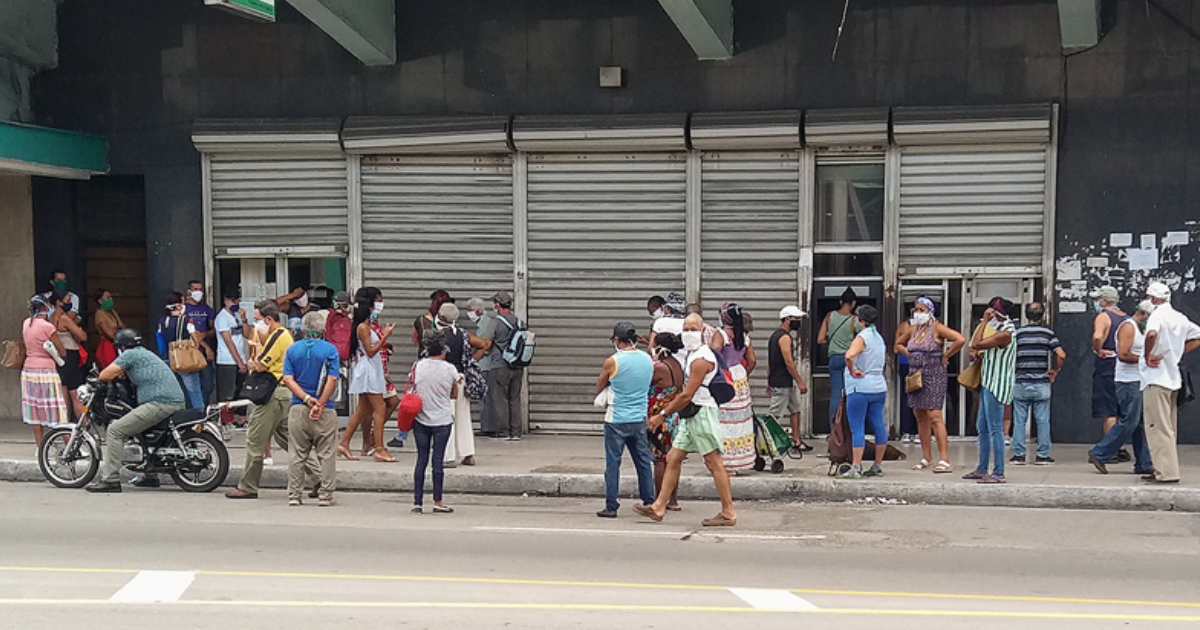
Given the difficulties and long lines to withdraw cash from theelectronic ATMs in Cuba, the authorities will limit cash withdrawals to MSMEs, self-employed workers and other economic actors in the private sector.
“We were informed that at the country level, some restrictions will soon be made to limit the withdrawal of such high volumes by these particular segments at ATMs,” he indicated this Monday.Ladys Mora García, deputy director of the accounting area at the Provincial Directorate of the Bank of Credit and Commerce (Bandec).
In statements to the official mediaEscambray, the board considered that the measure will improve the service and make the availability of cash last “a little longer.”
“We have some difficulties with cash, but not for ATMs. In its shortage, we are also being hit by the extraction of high volumes by particular segments such as MSMEs, self-employed workers, fundamentally,” he explained.
For the official, the population's perception of the operation of ATMs is erroneous.Thousands of Cubans complain of problems withdrawing money from ATMs, of units with breaks or out of service, and oflong lines of customers, but “the population does not understand how an ATM works.”
Locked in the “revolutionary” logic that poor service is improved with customer understanding, the country's banking authorities strive to do pedagogy instead of seeking solutions to problems.
“The withdrawal levels that occur today due to inflation are very high for the denominations that ATMs deliver and that causes us to have to resupply many times,” Mora García continued.
According to the directive, “it is not about putting money into it and that's it.” ATM servicedepends on other variables such as blackouts or the poor connection to the databases. “Today we present a very difficult situation with the technical part, there are electrical problems and we do not have battery backup,” he acknowledged.
“There are other technical problems that also affect and do not depend on us,especially the lack of communication, which do not connect to the database. In some places we were without connection for a day and there the ATM does not work. We have also been affected by blackouts, technical difficulties with the dispensers and lack of spare parts,” insisted the Bandec deputy director.
To alleviate the situation, the Cuban authorities have decided to establish a kind of “cap” on the cash withdrawals of entrepreneurs and other economic actors in the Island's battered private sector.
In addition, they seek to promote other forms of payment and cash withdrawal that alleviate the use of ATMs. “In the branches, the service is provided through the windows, in the commercial areas through online balance reservation, through the Post Office or POS terminal,” Mora García highlighted.
“They have asked us to approach the governments of the territories to promote the use of existing payment gateways, such as Bulevar Mi Transfer and EnZona. We intend for the vast majority of operations to be carried out through these means,” he added.
According to data from the BPA Provincial Directorate, there are many clients who already use these electronic options to pay for various services and make transfers, but the vast majority are individuals and not companies, MSMEs, or self-employed workers, who are the ones who concentrate the largest volumes. of cash for your transactions.
These options do not convince the Cuban private sector, which sees in them a mechanism for “control over their finances, since that money would go to their operating account and they would have to pay taxes there.”
“But sooner rather than later the country will have to put itself in order. Today almost everything is handled in cash and that is why these collapses occur. The idea is not to grow more in ATMs, but in operations through payment channels. We will have to train a lot. We have to break the ice for this change,” the official concluded, appealing again to the pedagogy and culture ofsome clients who, as such, should not worry about the functioning of the banks where they deposit their money.
The bankingization of the Cuban economy and the modernization of payment and transfer services - through ATMs, magnetic cards and digital payment platforms - are generating problems and discomfort among clients and users of these services, who perceive them as anachronistic in a society where technology collides with the stateization of services, blackouts, poor telecommunications and the systemic crisis of a country whose incapable leaders live clinging to power.
What do you think?
SEE COMMENTS (2)Filed in: